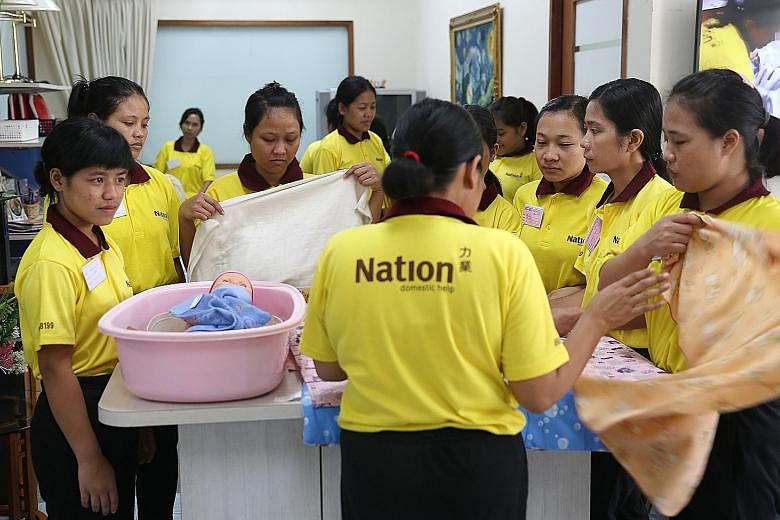When Ms Lidia arrived in Singapore from Indonesia last week to work as a maid, she noticed her day-long Settling-In Programme taught more than work safety and stress management - it included a module on the threat of terrorism.
The update to this programme, which all new foreign domestic workers (FDWs) must attend, was added last month, said the Ministry of Manpower (MOM).
Since January, the authorities have uncovered two more cases of radicalised FDWs, bringing the total to nine since 2015, said Second Minister for Home Affairs Desmond Lee in Parliament last Tuesday, when he responded to questions on terrorism.
Besides explaining how radical ideology may be spread in person and online, the new module also informed Ms Lidia on what to do if she encounters such attempts, and to alert her employer if it does happen.
The session took about an hour, said Ms Lidia, 28, who wanted to be known only by her first name.
"I was surprised that they explained about this, in addition to our daily work," she told The Straits Times. But she feels more prepared to handle such situations now.
For example, she and other new workers were told not to open the door to strangers or befriend unknown people online, for they may turn out to be scammers or purveyors of extremist ideology.
"But we were advised to reject them gently, and not be too harsh," said Ms Lidia, explaining that this is to avoid agitating the other party.
They were also briefed on how to react if a friend is found to be behaving differently, she said. Such signs include withdrawing from friends and suddenly becoming fervent about religious matters.
If their friends are unwilling to change with gentle persuasion, they should avoid them, she said.
The new module on the threat of terrorism was jointly developed by the Ministry of Home Affairs (MHA) and MOM.
It is "simple to understand", and includes tips on how FDWs can look out for telltale signs of radicalised individuals, as well as the police and Internal Security Department hotlines to call, said an MOM spokesman. All nationalities go through the updated course.
On average, between 100 and 200 FDWs attend the Settling-In Programme daily, he added. MOM numbers show there were 239,700 FDWs here as of December last year.
The Settling-In Programme, which began in 2012, includes an introduction to working in Singapore. It also gives FDWs information on conditions of employment, work safety, and relationship and stress management.
While it is for first-time domestic workers, employers can send their helpers to take the course again. It is conducted by accredited trainers from two approved training providers in English or domestic workers' native languages such as Bahasa Indonesia and Tagalog.
The MOM spokesman added that updates on the terror threat will also be given: "We will be pushing out more of such messages to FDWs through our collaterals."
Last December, MHA revealed that 65 foreign workers had been investigated in two years over terrorism fears.
Following the arrest of radicalised Bangladeshi workers last year, agencies working with foreign workers and FDWs have stepped up their outreach to educate them on the threat of radicalism. MOM also worked with MHA to advise all foreign workers living in dormitories not to engage in terror-related activities and to call a hotline if they suspect anyone of doing so or being radicalised, said the MOM spokesman.
Maid agency Nation Employment works with the police to conduct briefings every two months for workers at their boarding house.
Agency director Lim Chee Chong said it started the briefings in the second half of last year. "With social media, Singaporeans are affected too... We promote community harmony, so the helpers feel integrated with the community here, and do not sway towards extremist ideology."
Mr Kong Chee Min, chief executive of Centurion Corporation, which operates foreign workers' accommodation, said it carries out such police briefings at its dormitories every three months.
Staff meet resident prayer leaders every two months, instead of doing it on an ad hoc basis, and encourage the reporting of suspicious behaviour. Since early last year, residents have also been briefed on the dangers of religious extremism, he said.
Meanwhile, the Foreign Domestic Worker Association for Social Support and Training has included basic anti-radicalisation training in a two-day programme, which started last October.
Senior manager Tracy Tee, 65, said her family will consider sending their Indonesian domestic helper for the updated Settling-In Programme.
In the meantime, she encourages the helper to inform the family of any unusual activities.
"I tell her that since you've come to our home, you're a member of our family," she said. "You are helping to watch out for our safety, and we do so for you as well."


